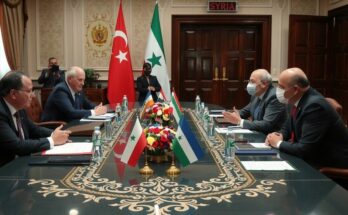Turkey has launched airstrikes against Kurdish targets in Iraq and Syria following a violent attack on TUSAS, a defense company, which killed five and injured over twenty. The PKK is blamed for the attack, and Turkish officials have vowed retaliation against the group. The incident further complicates prospects for peace negotiations in an ongoing conflict that stretches back decades.
In a significant escalation of military activity, Turkey’s Air Force has conducted airstrikes against Kurdish targets in Iraq and Syria as a response to a deadly attack on TUSAS, a prominent state-run aerospace and defense company located near Ankara. This assault resulted in the tragic loss of five lives and left over twenty individuals injured. The Turkish Ministry of National Defence declared that 32 targets associated with the Kurdistan Workers’ Party (PKK) were destroyed during the operation, while ensuring that measures were taken to protect civilian populations during the strikes. The military response followed closely after the Kurdish fighters executed a coordinated attack involving explosives and gunfire at TUSAS, a key player in the defense industry capable of producing civil and military aircraft, unmanned aerial vehicles (UAVs), and various other defense products. Turkish Interior Minister Ali Yerlikaya and Defence Minister Yasar Guler attributed this violent incident to the PKK, with Guler stating emphatically, “We give these PKK scoundrels the punishment they deserve every time. But they never come to their senses. We will pursue them until the last terrorist is eliminated.” The assault occurred shortly after Devlet Bahceli, leader of the Nationalist Movement Party, hinted at the possibility of parole for Abdullah Ocalan, the imprisoned leader of the PKK, contingent upon Ocalan’s renunciation of violence and disbandment of the organization. Turkish President Recep Tayyip Erdogan condemned the attack, labeling it a “heinous terrorist attack” during a bilateral meeting with Russian President Vladimir Putin as part of the BRICS summit. In a show of solidarity, the Iraqi embassy in Ankara condemned the attack on TUSAS, affirming Iraq’s rejection of terrorism in all forms and emphasizing its support for Turkey. This incident adds to Turkey’s ongoing military strategy, which has included regular airstrikes against PKK targets in Iraq and Kurdish groups linked to the PKK in Syria. The UAVs manufactured by TUSAS have played a pivotal role in Turkey’s offensive against Kurdish militants, a conflict that has raged since the 1980s and has left tens of thousands dead. The pro-Kurdish opposition party in Turkey criticized the attack, noting the potential for renewed discussions aimed at peace amidst heightened tensions. Al Jazeera’s correspondent in Ankara, Sinem Koseoglu, highlighted the increasing skepticism regarding the possibility of achieving peace in light of recent events.
The conflict between Turkey and the PKK has deep historical roots, dating back to the 1980s when the PKK initiated an armed struggle for autonomy in southeastern Turkey. The PKK is officially designated as a terrorist organization by Turkey and its allies in the West. Turkey has conducted various military operations to counter the PKK’s activities, particularly focusing on airstrikes in northern Iraq and against affiliated Kurdish groups in Syria. The ongoing violence has complicated diplomatic efforts aimed at resolving the situation, and recent developments, including attacks against strategic enterprises such as TUSAS, have reignited discussions on security and military responses.
In summary, Turkey’s recent airstrikes in Iraq and Syria were provoked by an attack on TUSAS, resulting in loss of life and injuries. The PKK was identified as the primary instigator of the attack, prompting Turkish officials to assert their commitment to eliminating what they perceive as a persistent terrorist threat. This incident raises critical questions surrounding the feasibility of peace negotiations amidst a backdrop of escalating military action and political rhetoric that continues to polarize the situation.
Original Source: www.aljazeera.com




